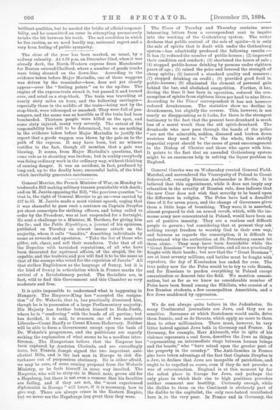The Times of Tuesday and Thursday contains some interesting letters
from a correspondent sent to inquire into the working of the G-othenburg system. The writer declares that public control of the sale of spirits—it is only the sale of spirits that is dealt with under the Gothenburg system—has admittedly produced the following results :— It has (1) reduced the number of public-houses; (2) improved their condition and conduct ; (3) shortened the hours of sale ; (4) stopped public-house drinking by persons under eighteen years of age ; (5) raised the price and lowered the strength of cheap spirits ; (6) insured a standard quality and measure ; (7) stopped drinking on credit; (8) provided good food in public-houses ; (0) eliminated the element of personal gain, behind the bar, and abolished competition. Further, it has, during the time it has been in operation, reduced the con- sumption of spirits from eighteen litres per head to nine litres. According to the Times' correspondent it has not however reduced drunkenness. The statistics show no decline in drunkenness, but slightly the reverse. This, however, is not nearly so disappointing as it looks, for there is the strongest testimony to the fact that the present beer-drunkard is much less of a moral wreck than the old spirit-drunkard. The drunkards who now pass through the hands of the police "are not the miserable, sodden, diseased and broken down wretches they used to be." On the whole, this strictly impartial report should be the cause of great encouragement to the Bishop of Chester and those who agree with him. It points to the fact that an amended Gothenburg system might be an enormous help in solving the liquor problem in England.


































 Previous page
Previous page